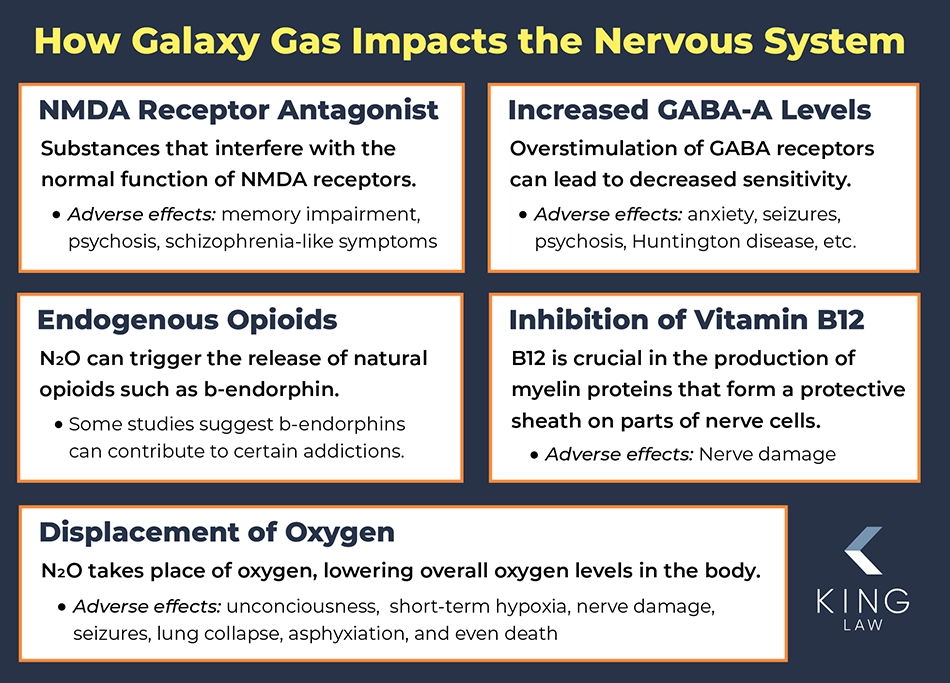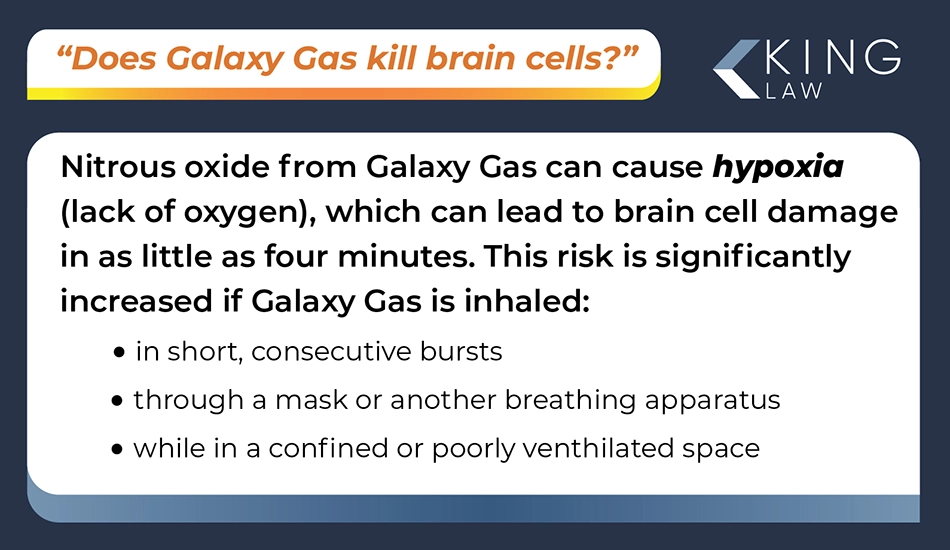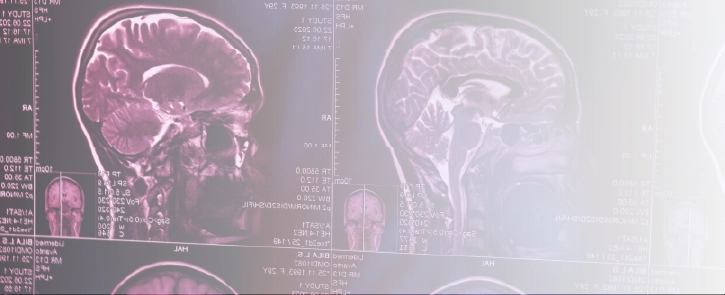Complete the form below to see if you qualify for a Whip-It Lawsuit

Galaxy Gas is a brand of nitrous oxide (N2O) that, when inhaled, has profound effects on the brain. Though sold as a whipped cream ingredient, Galaxy Gas has come under fire for being recreationally misused. When people inhale the gas to get high, it instantly impacts the brain and nervous system. Although Galaxy Gas causes a brief euphoria, it has many harmful impacts on the brain.
Galaxy Gas comes with serious risks of neurological harm, particularly with long-term abuse. This article explores both the short- and long-term consequences of Galaxy Gas on brain function, supported by clinical research and case studies.
About the Galaxy Gas Brain Effects
What Does Galaxy Gas Do to the Brain?
How Bad Is Galaxy Gas For Your Brain?
Does Galaxy Gas Kill Brain Cells?
How Many Brain Cells Does Galaxy Gas Kill?
Does Galaxy Gas Cause Brain Damage?
Studies Linking Galaxy Gas to Brain Problems
Have You Experienced Severe Side Effects By Inhaling Galaxy Gas?
King Law Is Investigating Galaxy Gas Neurological Injury Claims
What Does Galaxy Gas Do to the Brain?
Galaxy Gas has profound effects on the brain when inhaled, including affecting memory, senses, and cognitive functions. As an inhalant, Galaxy Gas is a dissociative drug. This means that Galaxy Gas makes people feel relaxed, relieves pain, and can make someone feel like they are not connected to their body (dissociation). It can also cause the brain to see or hear things that are not there (hallucinate).
Inhaling Galaxy Gas can have the following impacts on your brain:
- Induce euphoria
- Change how it processes pain
- Deprive it of oxygen and damage brain cells
- Change how it senses external stimuli (e.g., sights and sounds)
- Inactivate vitamin B-12 needed to protect nerve cells
- Affect memory or cognition
- Decrease white matter
- Induce mental health issues
- Cause loss of consciousness or seizures
The same qualities that make someone feel calm or giddy also jeopardize brain health. That is because Galaxy Gas affects many chemical reactions that normally occur in the brain. For example, Galaxy Gas impacts the nervous system in the following ways:
- NMDA receptor antagonism: N2O is an NMDA receptor antagonist, a class of substances that also includes ketamine. These agents have some potential uses in depression and Alzheimer’s treatments, but can also produce short-term schizophrenia-like symptoms.
- GABA-A enhancement: N2O increases GABA levels. High levels of this neurotransmitter contribute to feelings of sedation and relaxation.
- Oxygen displacement: Nitrous oxide displaces oxygen in the blood, leading to short-term hypoxia, meaning oxygen is depleted in the body. This contributes to sensations of lightheadedness. In extreme cases, it can also lead to unconsciousness or death.
- Activation of endogenous opioids: Nitrous oxide is not an opioid, but it can trigger the release of the body’s own opioids. These chemicals reduce pain sensitivity and can contribute to a sense of well-being.
With the exception of hypoxia, most of these elements do not represent a direct threat to the brain’s health. That comes mainly from another side effect of laughing gas: its ability to inactivate cobalamin (Vitamin B-12).

How Bad Is Galaxy Gas For Your Brain?
Galaxy Gas can be very bad for the brain and the central nervous system (spinal cord). Huffing it can lead to schizophrenia-like symptoms, psychosis, nerve cell damage, and paralysis, especially in chronic users. There have even been cases of people dying after using too much nitrous oxide, because their brain was cut off from oxygen for too long.
The ease with which nitrous oxide can be obtained, its medical applications, and its reputation as a light, harmless drug can mask just how harmful recreational N2O use can be for the brain. Users also run the risk of developing memory problems, brain fog, loss of feeling in their limbs, and dementia-like symptoms.
As noted above, some of the short-term effects of nitrous oxide are caused by hypoxia, which is literally a symptom of the brain not getting enough oxygen. If this state is prolonged, the individual can suffer brain damage. Long-term usage presents another risk to the brain and nervous system in the form of Vitamin B-12 deficiency. This vitamin is used for DNA synthesis and maintaining the protective myelin sheaths around nerve cells.
Does Galaxy Gas Kill Brain Cells?
Galaxy Gas can kill brain cells because it replaces oxygen in the body with nitrous oxide. Hypoxia (a lack of oxygen) can start to damage brain cells in as little as four minutes.
Because of this, the risk of brain damage increases when someone uses Galaxy Gas in quick, consecutive sessions. Doing this means the body’s oxygen levels cannot recover/stabilize. Additionally, inhaling the gas through a mask or in a confined space makes it even harder for the body to get the oxygen it needs. Certain cells in the brain are especially sensitive to oxygen deprivation. For example, hippocampal neurons associated with memory retention are particularly vulnerable to hypoxia.
Vitamin B-12 deficiency from long-term use is sometimes associated with leukoencephalopathy or damage to the white matter of the brain. Symptoms of leukoencephalopathy may manifest as difficulty concentrating, memory issues, impaired motor functions, or even personality changes.

How Many Brain Cells Does Galaxy Gas Kill?
There is no formula for how many brain cells each hit of Galaxy Gas will kill. A single use of nitrous oxide, as long as it doesn’t lead to prolonged hypoxia, is unlikely to kill brain cells. Rather, the risk of brain injury increases with repeated use or from using the gas in large quantities. The more times someone uses Galaxy Gas, the more likely they are to feel the cumulative effects of brain damage.
Consecutive uses increase the risk of a hypoxic injury, while long-term use raises the risk of vitamin-B-12-related degenerative issues. If this progressive damage is not treated early, it can lead to cognitive and motor impairments.
Does Galaxy Gas Cause Brain Damage?
Yes, Galaxy Gas can cause brain damage ranging from mild impairment to serious, long-term, and debilitating effects. Galaxy Gas can cause brain damage in two ways—by reducing oxygen in the blood and preventing the body from accessing vitamin B-12.
As noted above, the main mechanisms through which Galaxy Gas causes brain damage are:
- Oxygen deprivation (hypoxia): Brain cells can die when deprived of oxygen for four minutes or longer. Nitrous oxide displaces oxygen in the bloodstream and brain. Using nitrous oxide in confined spaces increases the risk of hypoxic injury. Long-term nitrous can also cause megaloblastic anemia, which can make hypoxic injuries more likely.
- Vitamin B12 inactivation: Vitamin B-12 plays a critical role in maintaining the nervous system. By inactivating vitamin B-12, Galaxy Gas can leave the brain vulnerable to demyelination and neurodegeneration. This damage to nervous system cells can manifest as hallucinations, emotional instability, and limb weakness or other cognitive and motor symptoms.
Studies Linking Galaxy Gas to Brain Problems
Medical research over the last decade has established a strong link between recreational nitrous oxide use and neurological injuries. Damage is often progressive, beginning with tingling or numbness in the extremities and potentially leading to cognitive problems and paralysis.
Study: Einsiedler et al. (2022): France – 5 Young Adults With Myelopathy
A study of five patients with a history of recent nitrous oxide abuse found that all five had symptoms of B-12 deficiency. Four of the individuals presented with subacute combined degeneration of spinal cord (SACD) and the fifth with acute inflammatory demyelinating polyneuropathy.
All had functional B-12 deficiency confirmed by elevated homocysteine and MMA. All five saw improvement in symptoms with medically guided B-12 supplementation.
Study: Winstock et al. (2019): Global Survey – Dose-Dependent Risk
A large-scale survey conducted in 2019 noted a link between how often surveyed individuals recreationally used whippets and reported symptoms of neuropathy (damage to nerves). More frequent users were more likely to report symptoms like numbness, tingling, and muscular weakness.
Have You Experienced Severe Side Effects By Inhaling Galaxy Gas?
If you have experienced numbness, mobility issues, memory loss, brain fog, or other serious side effects from Galaxy Gas abuse, you may have sustained neurological injuries. You should cease using nitrous oxide immediately, seeking assistance if you are having trouble quitting. You should also seek medical care to determine if you have a vitamin B-12 deficiency. Early intervention can reverse damage from nitrous oxide.
King Law Is Investigating Galaxy Gas Neurological Injury Claims
King Law is investigating claims of neurological injury related to Galaxy Gas. The manufacturers of Galaxy Gas likely did not adequately warn users of the dangers of inhalation. Therefore, the company may be liable for failing to warn, design defects, and negligent marketing. Individuals who have suffered a brain, spinal cord, or peripheral nerve injury may be eligible for compensation through a Galaxy Gas lawsuit.
Speak With a Galaxy Gas Lawyer Today
If Galaxy Gas harmed your body or mind, our lawyers are ready to support you as you seek compensation through a lawsuit. King Law offers free nitrous oxide case evaluations with no obligation. Contact us at (585) 496-2648 to schedule a consultation with our legal team. If you choose our lawyers to represent your case, you only owe us payment if we secure you compensation.
Acting quickly after you discover your injury can help you build a strong case within your state’s statute of limitations. Find out if you qualify for funds to help rebuild your life.

